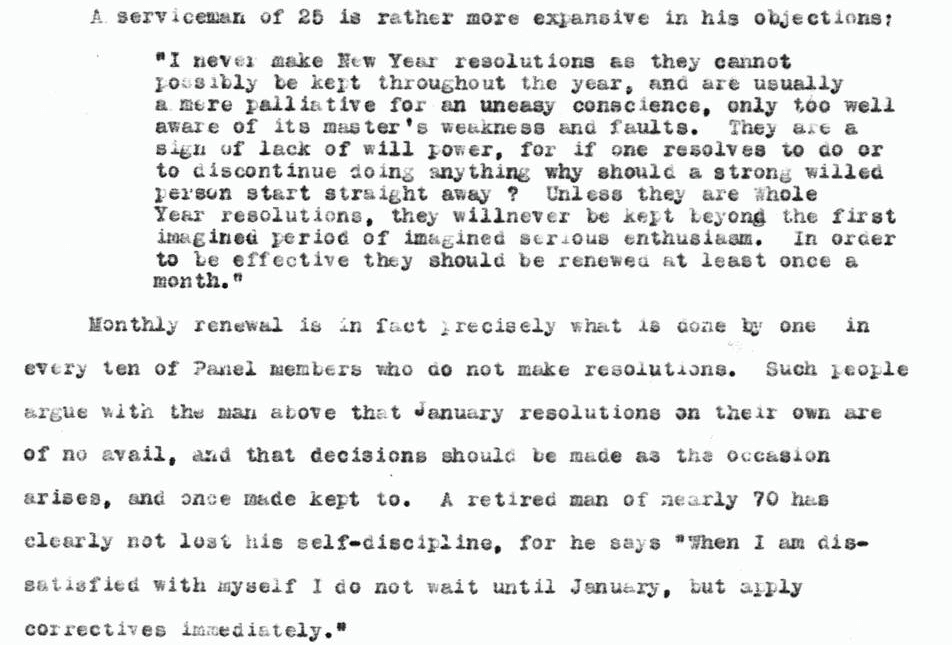New year, new you? New Year's resolutions from the Mass Observation Archive
New Year's resolutions. You either decide to have them or you don’t. Nowadays, it feels like there’s no escaping the obligation to quash bad habits and nurture new behaviours in their place. For others, it’s less of a burden and more of an opportunity to achieve an unfulfilled wish.
Whilst many people do make great progress on those New Year goals, some of us don't find it quite so easy. You may find yourself midway through January, still eating the leftover chocolate from Christmas you promised not to touch, your gym clothes have forgotten what light looks like, and you’ve decided that Dry-January isn’t going to help curb your love of prosecco through the other eleven months of the year anyway.
Well, you’re not alone, as a 1949 report about New Year's resolutions from our Mass Observation Online archive explores. Mass Observation’s National Panel were asked if they had set any resolutions for the year ahead and, if so, what they were. A year later, they were reminded of these resolutions and were asked to detail how well they managed to stick to them.
The types of resolutions people made in the late 1940s weren’t too dissimilar to common resolutions people still make today: to give up smoking, to drink less, to be tidier and more organised, to save money. Another aspect that hasn’t changed much are the amusing stories of spectacular resolution fails. Here are a few giggle-worthy mishaps:

'NEW YEAR'S RESOLUTIONS', November 1949, © Mass Observation Archive, University of Sussex Special Collections. Further reproduction is prohibited without permission.

'NEW YEAR'S RESOLUTIONS', November 1949, © Mass Observation Archive, University of Sussex Special Collections. Further reproduction is prohibited without permission.

'NEW YEAR'S RESOLUTIONS', November 1949, © Mass Observation Archive, University of Sussex Special Collections. Further reproduction is prohibited without permission.
Failing resolutions wasn’t a problem for those who insisted they do not make any resolutions. As well as those who never bothered making resolutions because they always broke them, there were those who felt setting yourself a goal on New Year’s Eve was pointless if not reviewed and renewed throughout the year. Some argued that waiting until New Year’s Eve to make life changes demonstrated a lack of willpower; if something dissatisfies us, we should act immediately:

'NEW YEAR'S RESOLUTIONS', November 1949, © Mass Observation Archive, University of Sussex Special Collections. Further reproduction is prohibited without permission.
Perhaps there is some reassuring advice to be had here from those who don’t set resolutions to those of us who do, but often fumble. Although the beginning of a new year offers the perfect opportunity to aspire to achieve a goal, this goal can grow, it can change, and it can begin any day of the year. If we’ve slipped up, we can simply get back on our feet and start again.
For more information about Mass Observation Online, including trial access and price enquiries, please contact us at info@amdigital.co.uk.
Recent posts

The blog highlights American Committee on Africa, module II's rich documentation of anti-apartheid activism, focusing on the National Peace Accord, global solidarity, and student-led divestment campaigns. It explores the pivotal role of universities, protests, and public education in pressuring institutions to divest from apartheid, shaping global attitudes toward social justice and reform.

This blog examines how primary sources can be used to trace the impact of young voices on society, particularly during pivotal voting reforms in the UK and the US. Explore materials that reveal insights into youth activism, intergenerational gaps, and societal perceptions, highlighting their interdisciplinary value for studying youth culture, activism, and girlhood across history.
